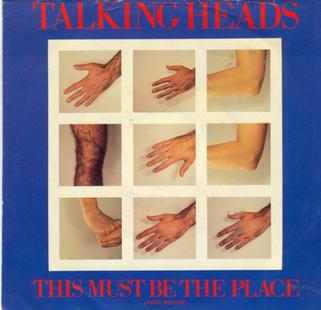
Inspired by the May 14 birthdays of Talking Heads‘ David Byrne, The Coasters/Cadets’ Dub Jones, The Black Keys’ Dan Auerbach, Raphael Saadiq, Bobby Darin, Cream’s Jack Bruce, The Cult’s Ian Astbury, Shanice and Tom Cochrane.

Inspired by the May 14 birthdays of Talking Heads‘ David Byrne, The Coasters/Cadets’ Dub Jones, The Black Keys’ Dan Auerbach, Raphael Saadiq, Bobby Darin, Cream’s Jack Bruce, The Cult’s Ian Astbury, Shanice and Tom Cochrane.
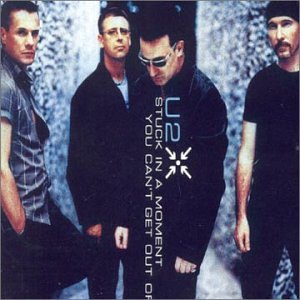
Inspired by Mother’s Day, the passing of Betty Wright, and the May 10 birthdays of U2‘s Bono, Sex Pistols’ Sid Vicious, Spinners’ Henry Fambrough, Donovan, Traffic’s Dave Mason, Larry Williams, Fred Astaire, Underworld’s Karl Hyde, Young MC, Filter’s Richard Patrick, Jay Ferguson, Craig Mack, Sunscreem’s Lucia Holm and Young Disciples’ Carleen Anderson.
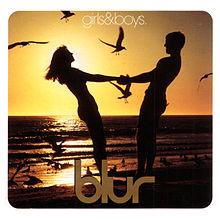
Inspired by the March 23 birthdays of Chaka Khan, The Cars’ Ric Ocasek, Blur’s Damon Albarn, and Louisiana Red.
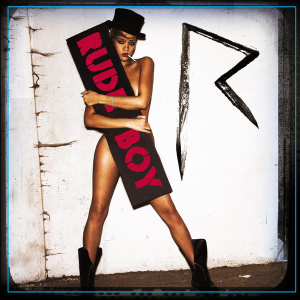
Inspired by the February 20 birthdays of Nirvana’s Kurt Cobain, Rihanna, Steely Dan’s Walter Becker, J.Geils, Spirit’s Randy California, Stone Roses’ Ian Brown, Seal, Backstreet Boys’ Brian Littrell, and Lindisfarne’s Alan Hull.
Click here to like Tunes du Jour on Facebook.
Follow me on Twitter.
Follow me on Instagram.

Inspired by the February 13 birthdays of New Order’s Peter Hook, Peter Gabriel, Robbie Williams, Feist, Black Flag’s Henry Rollins, Freedom Williams, the Monkees’ Peter Tork, Tennessee Ernie Ford, and songwriter Boudleaux Bryant, who, sometimes with his wife Felice, composed many of the Everly Brothers hits, including “Bye Bye Love,” “All I Have to Do Is Dream,” “Wake Up Little Susie,” “Bird Dog,” “Devoted To You,” and “Love Hurts.”
Tears for Fears, the duo consisting of Roland Orzabel and Curt Smith, released their debut album, The Hurting, in 1983. In their native England the album spawned three top five singles, “Mad World,” “Change” and “Pale Shelter.” In the US, their most successful single, “Change,” peaked at #73 on the Billboard Hot 100.
When it came time to do their second album, they wanted to break the US market. Needing one more song to round out the record, the duo’s producer, Chris Hughes, suggested Orzabel flesh out a song sketch he brought into the studio. Orzabel did so, and while he didn’t think much of the finished piece, Smith and Hughes thought this is the song that would change their fortunes stateside.
This song, “Everybody Wants to Rule the World,” was the first single released in the US from Songs from the Big Chair. It went to #1. The song that was the album’s first single in much of the world, “Shout,” was the second US single from the album, and the duo’s second #1.
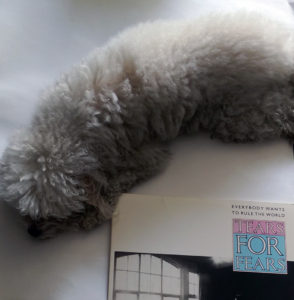
Today, Curt Smith of Tears for Fears turns 55 years old. Tunes du Jour’s weekly dance party kicks off with a song on which Smith sings lead, Tears for Fears’ #1 breakthrough hit “Everybody Wants to Rule the World.”
Click here to like Tunes du Jour on Facebook!
Follow me on Twitter: @TunesDuJour
Follow me on Instagram: @GlennSchwartz
On the off-chance I don’t win an Oscar for Best Original Screenplay, which, seeing as I have yet to write a single scene, is a remote possibility, I’d like to present the text of my acceptance speech here and now.
“Thank you! Thank you so much! Thank you! (wink at Meryl) Wow! I wasn’t expecting to win. This is such a surprise. Let me read you the speech I wrote for this occasion.
I’d like to thank the Academy, specifically the members who voted for me. I’d like to thank everyone who bought a ticket to see my movie. I’d like to thank the cast and crew. It takes a village! Am I right? Of course I’m right! I’m a right-er! (smile, acknowledge the laughter in the audience)
Mostly, I’d like to thank all those who taught me about writing and provided encouragement. I’d like to thank all of my English teachers, my writing teachers, my stand-up comedy teachers and my improvisation teachers. I’d like to thank my fellow classmates, workshops and meetup members and the friends and family members who provided feedback and support. In particular, I’d like to…oh, they’re playing the music, indicating it’s time for me to leave. Until next year, remember I love you all, except those who voted for my competitors.”
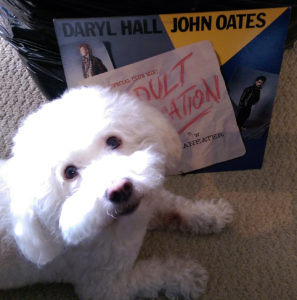
Today is National Teachers Day. Our weekly dance party kicks off with Daryl Hall and John Oates’ “Adult Education.”
Click here to like Tunes du Jour on Facebook!
Follow me on Twitter: @TunesDuJour
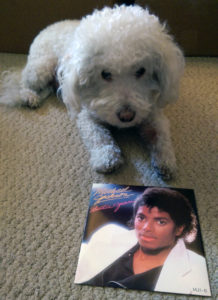
MTV debuted on August 1, 1981. Back then it was a music video network. It positioned itself as a rock station. Most of the videos shown were of songs made by Caucasian performers, though rock-leaning black acts such as Joan Armatrading and the Bus Boys got some play.
Then came “Billie Jean.” The second single from Michael Jackson’s Thriller, “Billie Jean” was accompanied by a stylish video featuring a mesmerizing performance from Jackson. However, it wasn’t a rock song. It didn’t fit the format of rock radio stations, and it didn’t fit the format of MTV either.
But there is a big difference between radio and music television. There were plenty of radio stations and many different formats. You may not hear “Billie Jean” on the rock stations, but you could hear it on r&b stations and pop stations and dance-leaning stations. However, there was only one music television – MTV.
In his autobiography, Howling at the Moon, Walter Yetnikoff, head of CBS Records, for whom Jackson recorded (and where I worked in my first music business job), wrote “I screamed bloody murder when MTV refused to air [Jackson’s] videos. They argued that their format, white rock, excluded Michael’s music. I argued they were racist assholes – and I’d trumpet it to the world if they didn’t relent. I’ve never been more forceful or obnoxious. I’ve also never been as effective, threatening to pull all our videos. With added pressure from [Thriller producer] Quincy Jones, they caved in, and in doing so the MTV color line came crashing down.”
Jackson’s video for “Billie Jean” aired on MTV, followed just weeks later by his video for “Beat It,” a song whose guitar solo from Eddie Van Halen helped make it a hit on rock radio. These two videos made Jackson, already a superstar, a worldwide phenomenon with a humongous fan base that transcended race, age and location in a way never seen before. These two videos made MTV, a year and a half old and fairly popular in white suburban areas, a cultural institution. These two videos made the music video, then not something done for many singles, particularly those performed by artists of color, an art form and a necessary marketing tool.
Some people tuned in to MTV to see the Michael Jackson videos, and while watching the channel, discovered other acts. Some people tuned in to MTV to watch “white rock” videos, and while watching the channel, discovered Michael Jackson.
MTV went to showcase more “non-rock” videos. In 1988, they launched their hugely popular program Yo! MTV Raps, something that would have been completely unexpected just five years earlier, pre-“Billie Jean.”
While MTV deserves credit for making “Billie Jean” and Thriller successful, the person most responsible is Jackson himself. He wrote the song. He sang the song. He danced the song. Quincy Jones did not want “Billie Jean” to appear on Thriller. He didn’t like the title. He didn’t like the bassline. He felt the song’s introduction was too long. Jackson argued “But that’s the jelly!…That’s what makes me want to dance.” Jones wasn’t ready for this jelly, but Jackson stood his ground.
In May of 1983, NBC aired a tribute to Motown Records. Motown: Yesterday, Today, Forever featuring many legends who recorded for the storied label performing their classics. We saw Diana Ross, the Temptations, Marvin Gaye, Smokey Robinson and the Miracles, Stevie Wonder, the Four Tops, Martha Reeves, Lionel Richie and the Commodores, Mary Wells, Junior Walker and then some. It was a terrific show, but the talk of the town following its airing was the performance of a song not from the Motown catalogue – Michael Jackson’s “Billie Jean.” The iconic performance, during which Jackson brought the famous moonwalk to the world at large, pushed him that much more ahead of any other performer working in music back then.
Following “Beat It,” CBS Records released four more singles from Thriller. All seven of the singles released (the album had only nine songs!) went top ten, breaking the record of most top ten hits from a single-artist album that was set a few years earlier by…Michael Jackson, whose Off the Wall gave us four. Before Thriller, four singles for one album was considered a lot. Thriller raised the bar for blockbuster albums, and subsequent releases such as Bruce Springsteen’s Born in the U.S.A., Prince’s Purple Rain, Def Leppard’s Hysteria and Janet Jackson’s Control each produced more than four hits.
“Billie Jean” changed everything.
On this week’s Throwback Thursday playlist, Tunes du Jour spotlights 1983, kicking off with Michael Jackson’s classic “Billie Jean.”
Click here to like Tunes du Jour on Facebook!
Follow me on Twitter: @TunesDuJour

Blondie’s hit single “Heart of Glass” was written by band members Debbie Harry and Chris Stein and had the working title of “The Disco Song.” Drummer Clem Burke said his part was inspired by the Bee Gees’ “Stayin’ Alive.”
Said Harry “When we did ‘Heart of Glass’ it wasn’t too cool in our social set to play disco. But we did it because we wanted to be uncool,” with the band’s keyboardist Jimmy Destri adding “We used to do ‘Heart of Glass’ to upset people.”
The song was included on Blondie’s Parallel Lines LP “as a novelty item to put more diversity into the album,” per Stein. The novelty song became the group’s first charted single and first #1, in 1979. Its success prompted John Lennon to send Ringo Starr a postcard advising to write songs like “Heart of Glass.”
Today’s Throwback Thursday playlist spotlights twenty of the best tracks from 1979, kicking off with Blondie’s upsetting disco novelty.
Click here to like Tunes du Jour on Facebook!
Follow me on Twitter: @TunesDuJour
Our weekly dance playlist kicks off with a track that was inspired by a song from the 1952 film Hans Christian Andersen. In the movie, Danny Kaye performs the Frank Loesser’s “Inchworm.” While schoolchildren sing “Two and two are four / Four and four are eight” etc., Kaye sings to the titular worm “You and your arithmetic/ You’ll probably go far,” and asking “Could it be you’d stop and see
how beautiful they are?” Singer-songwriter David Bowie told Performing Songwriter magazine “You wouldn’t believe the amount of my songs that have sort of spun off that one song. Not that you’d really recognize it. Something like ‘Ashes to Ashes’ wouldn’t have happened if it hadn’t have been for ‘Inchworm.’ There’s a child’s nursery rhyme element in it, and there’s something so sad and mournful and poignant about it. It kept bringing me back to the feelings of those pure thoughts of sadness that you have as a child, and how they’re so identifiable even when you’re an adult. There’s a connection that can be made between being a somewhat lost five-year old and feeling a little abandoned and having the same feeling when you’re in your twenties. And it was that song that did that for me.”
Today is David Bowie’s 69th birthday. Put on your red shoes and dance the blues with this playlist of club tunes.
Click here to like Tunes du Jour on Facebook!
Follow me on Twitter: @TunesDuJour